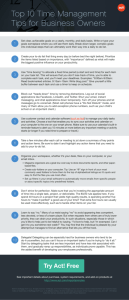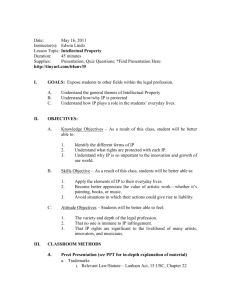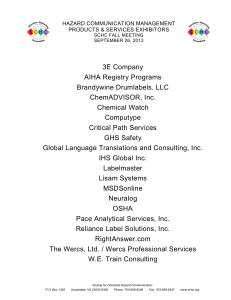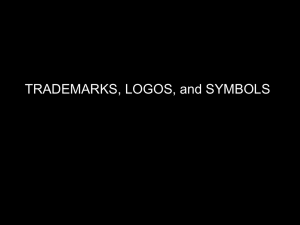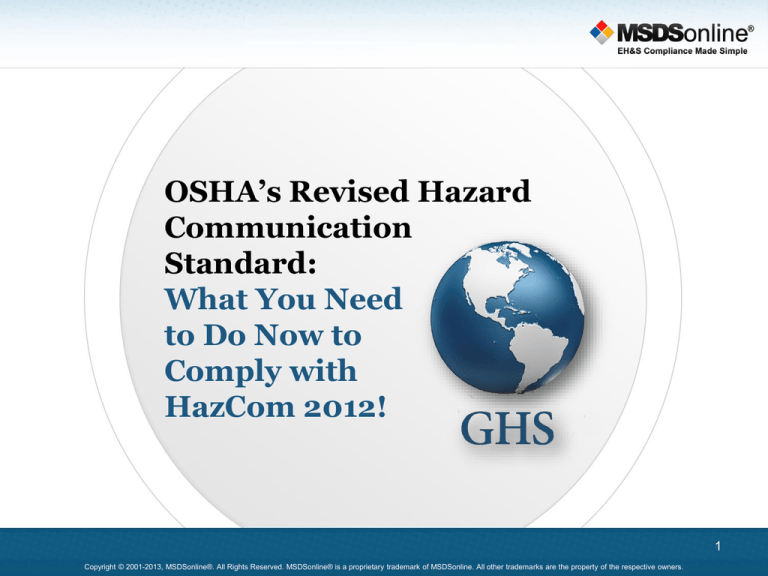
OSHA’s Revised Hazard
Communication
Standard:
What You Need
to Do Now to
Comply with
HazCom 2012!
1
Copyright © 2001-2013, MSDSonline®. All Rights Reserved. MSDSonline® is a proprietary trademark of MSDSonline. All other trademarks are the property of the respective owners.
Chuck Haling
Vice President of Sales, MSDSonline
2
Copyright © 2001-2013, MSDSonline®. All Rights Reserved. MSDSonline® is a proprietary trademark of MSDSonline. All other trademarks are the property of the respective owners.
Goals for this Presentation
Avoid This….
Brief Review of OSHA’s HCS
Discuss OSHA’s Alignment with the GHS
Understand reasons for adoption
Learn how to comply
3
Copyright © 2001-2013, MSDSonline®. All Rights Reserved. MSDSonline® is a proprietary trademark of MSDSonline. All other trademarks are the property of the respective owners.
What is HCS?
An OSHA Regulation
4
Copyright © 2001-2013, MSDSonline®. All Rights Reserved. MSDSonline® is a proprietary trademark of MSDSonline. All other trademarks are the property of the respective owners.
`
A.K.A…
5
Copyright © 2001-2013, MSDSonline®. All Rights Reserved. MSDSonline® is a proprietary trademark of MSDSonline. All other trademarks are the property of the respective owners.
HCS
HazCom Standard
Right-to-Know
1910.1200
The HazCom Reg
Hazard Communication
The Reg
RTK
29 CFR 1910.1200
HazCom
6
Copyright © 2001-2013, MSDSonline®. All Rights Reserved. MSDSonline® is a proprietary trademark of MSDSonline. All other trademarks are the property of the respective owners.
What is HCS?
Hazard Communication Standard
An OSHA Regulation – protect workers from
hazardous chemicals
Adopted in 1983
Covers 43+ Million U.S. Workers
5 Million Workplaces
Over 880,000 Chemicals
7
Copyright © 2001-2013, MSDSonline®. All Rights Reserved. MSDSonline® is a proprietary trademark of MSDSonline. All other trademarks are the property of the respective owners.
Purpose of HCS
“…to ensure hazards of all chemicals
produced or imported are evaluated and
details regarding their hazards are
transmitted to employers and employees”
“Ensure requirements are
consistent nationwide”
8
Copyright © 2001-2013, MSDSonline®. All Rights Reserved. MSDSonline® is a proprietary trademark of MSDSonline. All other trademarks are the property of the respective owners.
HCS Main Requirements
1
Written Plan
2
Chemical Inventory
3
Labels & Warnings
4
Training
5
MSDS Documents
9
Copyright © 2001-2013, MSDSonline®. All Rights Reserved. MSDSonline® is a proprietary trademark of MSDSonline. All other trademarks are the property of the respective owners.
Chemicals Covered – Old HCS
Physical Hazards
Combustible Liquids
Compressed Gases
Explosives
Flammables
Organic Peroxides
Oxidizers
Pyrophorics
Unstable (Reactive) Materials
Water-Reactives
10
Copyright © 2001-2013, MSDSonline®. All Rights Reserved. MSDSonline® is a proprietary trademark of MSDSonline. All other trademarks are the property of the respective owners.
Chemicals Covered – Old HCS
Health Hazards
Chemicals that may produce acute or chronic health
effects in exposed employees.
Carcinogens
Toxic agents
Reproductive toxins
Irritants
Corrosives
Sensitizers
Hepatotoxins
Nephrotoxins
Neurotoxins
Agents which act on the
hematopoietic system
Agents which damage
the lungs, skin, eyes or
mucous membranes
11
Copyright © 2001-2013, MSDSonline®. All Rights Reserved. MSDSonline® is a proprietary trademark of MSDSonline. All other trademarks are the property of the respective owners.
Who has Responsibilities
Chemical Manufacturers
Evaluate and now also classify hazards of chemicals
Provide labels & MSDSs to employers to which they ship
chemicals
Importers & Distributors
Provide labels & MSDSs to employers to which they ship
chemicals
Employers Who “Use” Chemicals
Are responsible for the following as part of a compliant HazCom program:
1.
2.
3.
4.
Written Hazard Communication Plan / Program
Written Chemical Inventory
Ensuring proper use of Labels and Warnings
Maintaining MSDSs and providing Right-to-Know access
to employees
5. Providing Employee Training
12
Copyright © 2001-2013, MSDSonline®. All Rights Reserved. MSDSonline® is a proprietary trademark of MSDSonline. All other trademarks are the property of the respective owners.
The Problem
When it comes to Hazard Communication…
Regulations vary widely internationally
E.g., U.S. has HazCom Standard, Canada has WHMIS,
Europe has CLP
Different agencies within the same country may
have jurisdiction over hazardous chemical use
and safety
E.g., in the U.S.: EPA, DOT, OSHA, Consumer Product Safety Commission
Multiple labels & MSDSs required for same
product to satisfy different country & agency
requirements
Resulting in confusion for end-users
Creating trade issues/hassles multinational companies
Costly & time consuming to manage
13
Copyright © 2001-2013, MSDSonline®. All Rights Reserved. MSDSonline® is a proprietary trademark of MSDSonline. All other trademarks are the property of the respective owners.
Enter GHS
GHS = Globally Harmonized System of Classification and
Labelling of Chemicals
1st edition approved in 2002 and published by UN in 2003
Result of international mandate (Chapter 19 of Agenda
21) from 1992 Rio Earth Summit (i.e.,UNCED)
Deemed to be single most important driving force behind the creation of GHS
Aimed to be completed GHS by 2000
A coordinating group chaired by OSHA was established to manage the work
Common & coherent global approach
To Classifying and Defining
& Communicating Hazards
Provides Consistency/
Harmonization to Labels and
Safety Data Sheets
14
Copyright © 2001-2013, MSDSonline®. All Rights Reserved. MSDSonline® is a proprietary trademark of MSDSonline. All other trademarks are the property of the respective owners.
GHS At-A-Glance
GHS is Not…
A Regulation, Standard or Mandate
GHS is…
An Approach. It contains criteria, provisions, and
explanatory text for harmonizing hazard
communication
Adaptable by Country (and Agency)
Referred to as the “Building Block Approach”
Select parts of system that apply to existing regulations
Implementation consistent with requirements
in place, or can use to create new requirements
15
Copyright © 2001-2013, MSDSonline®. All Rights Reserved. MSDSonline® is a proprietary trademark of MSDSonline. All other trademarks are the property of the respective owners.
Why is GHS Needed?
Better Trade
Compliance with multiple regulations is costly
and time-consuming
Regulatory burdens
make it difficult
for companies
to compete
internationally
16
Copyright © 2001-2013, MSDSonline®. All Rights Reserved. MSDSonline® is a proprietary trademark of MSDSonline. All other trademarks are the property of the respective owners.
OSHA Alignment with GHS
Revise HCS to Align with GHS
Maintain HCS framework
Enhance protection
Based on GHS Rev 3 (2009)
Major Changes
Chemical Classification
Safety Data Sheets (SDSs)
Labels
Compliance Enforcement – Phased In
Employees Trained on How to Read SDS/Label by Dec. 1, 2013
Manufacturers and Distributors Complete Reclassification and Produce
Updated SDSs and Labels by June 1, 2015
Distributors may ship inventory with old SDS/Labels until Dec. 1, 2015
Full Employer Compliance Expected by June 1, 2016
Transitional Period can comply with old or new HCS/HazCom 2012
17
Copyright © 2001-2013, MSDSonline®. All Rights Reserved. MSDSonline® is a proprietary trademark of MSDSonline. All other trademarks are the property of the respective owners.
Employee Training
18
Copyright © 2001-2013, MSDSonline®. All Rights Reserved. MSDSonline® is a proprietary trademark of MSDSonline. All other trademarks are the property of the respective owners.
Principle’s of OSHA’s Alignment
HCS requirements will not be reduced
Modifications made to support GHS
Not a total rewrite of the regulation
Bulk of tech requirements in Appendices
Versus regulatory text
Largely apply to chemical
producers vs. users
OSHA estimates net
savings for employers to
be over $500 million/year
19
Copyright © 2001-2013, MSDSonline®. All Rights Reserved. MSDSonline® is a proprietary trademark of MSDSonline. All other trademarks are the property of the respective owners.
HCS / HazCom 2012 Appendicies
Appendix A: Health Hazard Criteria
Appendix B: Physical Hazard Criteria
Appendix C: Allocation of Label Elements
Appendix D: Safety Data Sheets
Appendix E: Definition of "Trade Secret”
Appendix F: Guidance for Hazard Classification
Regarding Carcinogenicity
20
Copyright © 2001-2013, MSDSonline®. All Rights Reserved. MSDSonline® is a proprietary trademark of MSDSonline. All other trademarks are the property of the respective owners.
Two Most Prevalent Changes
Hazard Classification Criteria
Health & Environmental Hazards
Physical Hazards
Mixtures
Hazard ‘Communication’
Labels
Safety Data Sheets
Training
OSHA is referring to revised
standard as “HazCom 2012”
21
Copyright © 2001-2013, MSDSonline®. All Rights Reserved. MSDSonline® is a proprietary trademark of MSDSonline. All other trademarks are the property of the respective owners.
Two Most Prevalent Changes
OSHA added the definition of Classification
to the revised standard:
“"Classification" means to identify the
relevant data regarding the hazards of a
chemical; review those data to ascertain the
hazards associated with the chemical; and
decide whether the chemical will be classified
as hazardous according to the definition of
hazardous chemical in this section.”
22
Copyright © 2001-2013, MSDSonline®. All Rights Reserved. MSDSonline® is a proprietary trademark of MSDSonline. All other trademarks are the property of the respective owners.
Two Most Prevalent Changes
2nd Key Component of the New Definition:
“In addition, classification for health and
physical hazards includes the determination
of the degree of hazard, where appropriate,
by comparing the data with the criteria for
health and physical hazards.”
23
Copyright © 2001-2013, MSDSonline®. All Rights Reserved. MSDSonline® is a proprietary trademark of MSDSonline. All other trademarks are the property of the respective owners.
UN’s GHS Hazard Classifications
Health & Environmental
Acute Toxicity
Aspiration Toxicity
Skin Corrosion/Irritation
Serious Eye Damage/Eye
Irritation
Respiratory or Skin
Sensitization
Germ Cell Mutagenicity
Carcinogenicity
Reproductive Toxicity
Target Organ Systemic
Toxicity – Single and
Repeated Dose
Hazardous to the Aquatic
Environment/Aquatic Toxicity
Hazardous to the Ozone
Layer
Physical
Explosives
Flammable – Gases,
Aerosols Liquids, Solids
Oxidizers– liquids, solids,
gases
Self-Reactive Substances
Self-Heating Substances
Pyrophoric – liquids, solids
Organic Peroxides
Corrosive to Metals
Gases Under Pressure
Water-Activated Flammable
Gases
24
Copyright © 2001-2013, MSDSonline®. All Rights Reserved. MSDSonline® is a proprietary trademark of MSDSonline. All other trademarks are the property of the respective owners.
HazCom 1994 vs HazCom 2012
HCS/HazCom 1994
Gases Under Pressure
Carcinogenicity
GHS Alignment/ HazCom 2012
Compressed Gases
Refrigerated Gases
Liquefied Gases
Dissolved Gases
Carcinogenicity
Category 1
1A = Known
1B = Probable
Category 2
Suspected
Note the numbering scheme:
Lower the #, the more severe
the hazard
25
Copyright © 2001-2013, MSDSonline®. All Rights Reserved. MSDSonline® is a proprietary trademark of MSDSonline. All other trademarks are the property of the respective owners.
UN’s GHS Hazard Classifications
Health & Environmental
Acute Toxicity
Aspiration Toxicity
Skin Corrosion/Irritation
Serious Eye Damage/Eye
Irritation
Respiratory or Skin
Sensitization
Germ Cell Mutagenicity
Carcinogenicity
Reproductive Toxicity
Target Organ Systemic
Toxicity – Single and
Repeated Dose
Hazardous to the Aquatic
Environment/Aquatic Toxicity
Hazardous to the Ozone
Layer
Physical
Explosives
Flammable – Gases,
Aerosols Liquids, Solids
Oxidizers– liquids, solids,
gases
Self-Reactive Substances
Self-Heating Substances
Pyrophoric – liquids, solids
Organic Peroxides
Corrosive to Metals
Gases Under Pressure
Water-Activated Flammable
Gases
26
Copyright © 2001-2013, MSDSonline®. All Rights Reserved. MSDSonline® is a proprietary trademark of MSDSonline. All other trademarks are the property of the respective owners.
Under New OSHA Definition…
OSHA incorporated new elements into its revised
definition of Hazardous Chemical
To include 3 classes of chemicals defined in its HCS that weren’t in GHS, Rev. 3
“Hazardous Chemical” means any chemical which is
classified as a
1)
2)
3)
4)
5)
Physical hazard; or
Health hazard; or
Simple asphyxiant; or
Combustible dust; or
Pyrophoric gas; or
6)
Hazard Not Otherwise Classified (HNOC)
27
Copyright © 2001-2013, MSDSonline®. All Rights Reserved. MSDSonline® is a proprietary trademark of MSDSonline. All other trademarks are the property of the respective owners.
3 OSHA Specified Hazards - HazCom 2012
28
Copyright © 2001-2013, MSDSonline®. All Rights Reserved. MSDSonline® is a proprietary trademark of MSDSonline. All other trademarks are the property of the respective owners.
Labels
Six Main Elements
Product/Chemical Identifier
29
Copyright © 2001-2013, MSDSonline®. All Rights Reserved. MSDSonline® is a proprietary trademark of MSDSonline. All other trademarks are the property of the respective owners.
Labels
Six Main Elements
Product/Chemical Identifier
Supplier Identifier
30
Copyright © 2001-2013, MSDSonline®. All Rights Reserved. MSDSonline® is a proprietary trademark of MSDSonline. All other trademarks are the property of the respective owners.
Labels
Six Main Elements
Product/Chemical Identifier
Supplier Identifier
Hazard Pictogram(s)*
* Standardized under GHS
31
Copyright © 2001-2013, MSDSonline®. All Rights Reserved. MSDSonline® is a proprietary trademark of MSDSonline. All other trademarks are the property of the respective owners.
Label Pictograms North America
Current North America (U.S. DOT/ Canada WHMIS) Systems
32
Copyright © 2001-2013, MSDSonline®. All Rights Reserved. MSDSonline® is a proprietary trademark of MSDSonline. All other trademarks are the property of the respective owners.
Label Pictograms – DOT and GHS
Transport Pictograms
GHS Pictograms
33
Copyright © 2001-2013, MSDSonline®. All Rights Reserved. MSDSonline® is a proprietary trademark of MSDSonline. All other trademarks are the property of the respective owners.
Label Pictograms
Exploding Bomb
Explosives
Self Reactive
Organic Peroxide
Gas Cylinder
Flame
Flame Over Circle
Flammable
Self Reactive
Pyrophoric
Self-Heating
Emits Flammable Gas
Organic Peroxides
Skull and Crossbones
Gases Under
Pressure
Health Hazard
Acute Toxicity
(Fatal or toxic)
Exclamation Mark
Carcinogenicity
Respiratory Sensitizer
Reproductive Toxicity
Target Organ Toxicity
Mutagenicity
Aspiration Toxicity
Skin & Eye Irritant
Dermal Sensitizer
Acute Toxicity (harmful)
Transient Target Organ
Effects
Harmful to Ozone Layer
(Not mandatory)
Oxidizers
Corrosion
Skin Corrosion
Corrosive to
Metals
Serious Damage
to Eye
Environment
(Not mandatory)
Environmental
Toxicity
34
Copyright © 2001-2013, MSDSonline®. All Rights Reserved. MSDSonline® is a proprietary trademark of MSDSonline. All other trademarks are the property of the respective owners.
Labels
Six Main Elements
Product/Chemical Identifier
Supplier Identifier
Hazard Pictogram(s)*
Signal Word
* Standardized under GHS
35
Copyright © 2001-2013, MSDSonline®. All Rights Reserved. MSDSonline® is a proprietary trademark of MSDSonline. All other trademarks are the property of the respective owners.
Labels
Product/Chemical Identifier
Supplier Identifier
Hazard Pictogram(s)*
Signal Word
Hazard Statement(s)*
* Standardized under GHS
36
Copyright © 2001-2013, MSDSonline®. All Rights Reserved. MSDSonline® is a proprietary trademark of MSDSonline. All other trademarks are the property of the respective owners.
Labels
Product/Chemical Identifier
Supplier Identifier
Hazard Pictogram(s)*
Signal Word
Hazard Statement(s)*
Precautionary Information **
* Standardized under GHS
** Standardized under HCS
37
Copyright © 2001-2013, MSDSonline®. All Rights Reserved. MSDSonline® is a proprietary trademark of MSDSonline. All other trademarks are the property of the respective owners.
Workplace Labeling
Employers May Continue to Use Current
Workplace-Specific Labeling Systems
If they contain required information
If they are consistent with new classifications
Labels on Incoming Containers
Must not be removed or defaced
Unless immediately replaced
Workplace Labels
Must be prominently displayed
In English
Other languages permitted (additionally)
38
Copyright © 2001-2013, MSDSonline®. All Rights Reserved. MSDSonline® is a proprietary trademark of MSDSonline. All other trademarks are the property of the respective owners.
Workplace Labeling
Best practice - Whenever possible, replicate the shipping
label
OSHA says your Workplace Labeling System + Employee Training
should = at least the Same Level of Understanding as Shipped Label
OSHA says you can:
Use GHS shipped label
Use current system, so long as it :
Accounts for GHS changes
Doesn’t present conflicting information (with GHS changes)
When combined with your training, provides at least the same level of
understanding as GHS shipped label
Includes use of alternative labeling systems like NFPA or HMIS
39
Copyright © 2001-2013, MSDSonline®. All Rights Reserved. MSDSonline® is a proprietary trademark of MSDSonline. All other trademarks are the property of the respective owners.
Safety Data Sheets
Redefined as Safety Data
Sheets (SDS)
GHS includes 16-part format
Essentially the ANSI Standard
=
Several Sections are not Mandatory
Sections 12-15
Ecological information
Disposal considerations
Transport information
Regulatory information
Outside of OSHA’s jurisdiction
New Appendix D
Details what is to be included in each section
40
Copyright © 2001-2013, MSDSonline®. All Rights Reserved. MSDSonline® is a proprietary trademark of MSDSonline. All other trademarks are the property of the respective owners.
SDS – Headings
1. Identification
2. Hazard(s) Identification
9. Physical & Chemical
Properties
3. Composition/Ingredient
Information
10. Stability & Reactivity
4. First-Aid Measures
12. Ecological Information
5. Fire-Fighting Measures
13. Disposal Considerations
6. Accidental Release
Measures
14. Transport Information
7. Handling and Storage
16. Other Information
11. Toxicological Information
15. Regulatory Information
8. Exposure Control/
Personal Protection
41
Copyright © 2001-2013, MSDSonline®. All Rights Reserved. MSDSonline® is a proprietary trademark of MSDSonline. All other trademarks are the property of the respective owners.
SDS – Key Changes
Section 2 – Hazard(s) Identification
GHS Classification
Pictograms
Signal Word
Hazard
Statement
Precautionary
Statement
42
Copyright © 2001-2013, MSDSonline®. All Rights Reserved. MSDSonline® is a proprietary trademark of MSDSonline. All other trademarks are the property of the respective owners.
SDS – To Do
Make sure staff is on the lookout for new, GHS
formatted SDSs – especially for chemicals you
regularly receive
Talk to your chemical suppliers and ask about their
plans to transition to GHS – the sooner switch over
happens…the easier it will be on us all
Be in active preparation mode for GHS training.
Have a plan and make sure employees are ready to
read the GHS SDSs and labels
Don’t forget SARA obligations: update local and
state emergency response agencies when new
chemical hazard information becomes available
43
Copyright © 2001-2013, MSDSonline®. All Rights Reserved. MSDSonline® is a proprietary trademark of MSDSonline. All other trademarks are the property of the respective owners.
Who’s Affected?
Chemical Manufacturers have some work to do
around re-classifying chemicals, and then reauthoring MSDSs, labels and warnings to make
them GHS compliant
Pretty much everyone who “uses” hazardous
Resellers,
Distributors, Importers get new
chemicals has some responsibility…
MSDSs and labels
ASAP
& distribute
to
some more
than
others
customers
Employers...
44
Copyright © 2001-2013, MSDSonline®. All Rights Reserved. MSDSonline® is a proprietary trademark of MSDSonline. All other trademarks are the property of the respective owners.
Employers...
Have an HCS plan!
Maintain a checklist
of key plan
components
Inventory your on-site
chemicals
Make sure you have a
complete library of
MSDSs
Review it annually, at
least
Prepare yourself for
the eventual MSDS
churn
If you’re still using
paper, consider
transitioning to
electronic system
Make sure your
secondary labeling
system is GHS
compliant
Start developing a
training plan for your
employees
Stay current on OSHA
Federal
State & local
Keep an eye on GHS
Key dates
Impact on your plan
Request GHS
compliant SDSs from
chemical vendors
Ensure staff is on the
lookout for SDSs with
new shipments
Stay SARA compliant
45
Copyright © 2001-2013, MSDSonline®. All Rights Reserved. MSDSonline® is a proprietary trademark of MSDSonline. All other trademarks are the property of the respective owners.
Penalties for Noncompliance Are Very Real
From 2009 – 2012
OSHA cited over
24,000 instances of
HCS violations in
workplaces across the
United States
#2 on OSHA’s top 10
list of most frequently
cited compliance
standards for 2012
Source: www.OSHA.gov
46
Copyright © 2001-2013, MSDSonline®. All Rights Reserved. MSDSonline® is a proprietary trademark of MSDSonline. All other trademarks are the property of the respective owners.
Costs Add Up Quickly
Fines
Potential Risk & Liability
Downtime & Internal Disruption
Lost Revenues
Negative Press & Impact to
Corporate Image
47
Copyright © 2001-2013, MSDSonline®. All Rights Reserved. MSDSonline® is a proprietary trademark of MSDSonline. All other trademarks are the property of the respective owners.
Negative Corporate Image
48
Copyright © 2001-2013, MSDSonline®. All Rights Reserved. MSDSonline® is a proprietary trademark of MSDSonline. All other trademarks are the property of the respective owners.
It’s not just about…
49
Copyright © 2001-2013, MSDSonline®. All Rights Reserved. MSDSonline® is a proprietary trademark of MSDSonline. All other trademarks are the property of the respective owners.
Avoiding
citations…
50
Copyright © 2001-2013, MSDSonline®. All Rights Reserved. MSDSonline® is a proprietary trademark of MSDSonline. All other trademarks are the property of the respective owners.
…and fines
51
Copyright © 2001-2013, MSDSonline®. All Rights Reserved. MSDSonline® is a proprietary trademark of MSDSonline. All other trademarks are the property of the respective owners.
it’s also about…
52
Copyright © 2001-2013, MSDSonline®. All Rights Reserved. MSDSonline® is a proprietary trademark of MSDSonline. All other trademarks are the property of the respective owners.
our employees…
53
Copyright © 2001-2013, MSDSonline®. All Rights Reserved. MSDSonline® is a proprietary trademark of MSDSonline. All other trademarks are the property of the respective owners.
our customers…
54
Copyright © 2001-2013, MSDSonline®. All Rights Reserved. MSDSonline® is a proprietary trademark of MSDSonline. All other trademarks are the property of the respective owners.
our community…
55
Copyright © 2001-2013, MSDSonline®. All Rights Reserved. MSDSonline® is a proprietary trademark of MSDSonline. All other trademarks are the property of the respective owners.
Questions
1.888.362.2007
www.MSDSonline.com
sales@MSDSonline.com
chaling@MSDSonline.com
57
Copyright © 2001-2013, MSDSonline®. All Rights Reserved. MSDSonline® is a proprietary trademark of MSDSonline. All other trademarks are the property of the respective owners.


